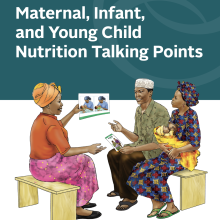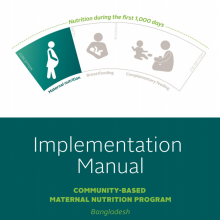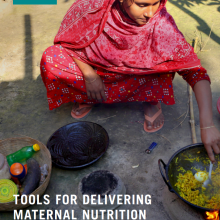Job aid
Aug 15 2023

MIYCN Talking Points for Community Mobilization Volunteers
This guide provides talking points for community mobilization volunteers in Nigeria to utilize when advising mothers and their family members on best practices in maternal nutrition, breastfeeding, and complementary feeding for young children.
Journal article
Sep 09 2021

Maternal resources for care are associated with child growth and early childhood development in Bangladesh and Vietnam (Basnet S., Child: Care, Health and Development. 2021)
Resources for care, represented by maternal height, well-nourishment, mental well-being, decision-making, support in chores and perceived social support, were analyzed against Alive & Thrive baseline data from household surveys in Bangladesh and Viet Nam and found to be associated with child
Journal article
Jun 01 2019

Using Multilevel Modeling to Understand Individual and Community-level Determinants of Anemia in Ethiopia
Journal article
Jan 11 2019

Nutrition interventions integrated into an existing maternal, neonatal, and child health program reduced food insecurity among recently delivered and pregnant women in Bangladesh (Frongillo E., 2019. Journal of Nutrition)
This study investigated whether participation in nutrition-focused antenatal care can be a way to reduce food insecurity during pregnancy and the postpartum period.
Guide/Manual
Aug 03 2017

Implementation manual: Community-based maternal nutrition program
The resources below provide MNCH program leaders and implementers with tools for delivering maternal nutrition programs at scale. The materials were originally developed in 2016 by the Government of Bangladesh, BRAC, and Alive & Thrive. The program was funded by Global Affairs Canada.
Toolkit
Aug 03 2017

Tools for delivering maternal nutrition programs
Alive & Thrive used the tools presented in this document to implement its maternal nutrition program from 2015-2016.

